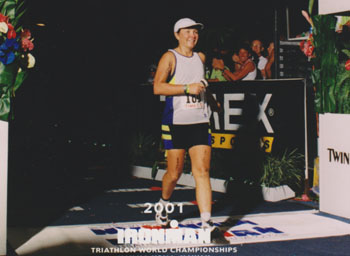Campus News
Play depicts the struggles, lessons of ALS
The one-woman performance of The Voice Bank, brought to UC Santa Cruz as a faculty member suffers from ALS, is about finding strength in the face of the disease—and about letting go.

Mary Zavanelli, a 61-year-old teaching professor of biology at UC Santa Cruz, suffers from Amyotrophic Lateral Sclerosis (ALS), a fatal disease that slowly strips its sufferers of movement, speech, and eventually breath. A 66-year-old Southern California litigator and actress named Terry is ill with the same malady.
The two women have never met, but a series of six-degrees-of-separation events has resulted in a free, upcoming performance of a one-woman play titled The Voice Bank, which deals with the struggles and lessons of living with ALS. The performance will be at 2 p.m. July 9 at the UC Santa Cruz DANM Digital Arts Resource Center Room 108.
“This play is a little bit about making your own rules and defining your own health and the question of who owns the knowledge of your body,” says Andrea Caban, 39, a professor of speech and voice and an actress who not only wrote the play based on her own experiences but will perform the work as well.
“It’s also,” she says, “about letting go.”
Zavanelli, who taught a variety of subjects at UC Santa Cruz including popular classes on female physiology and the biology of AIDS, was a dedicated athlete before she was diagnosed with ALS 2 1/2 years ago. She’d entered 15 Ironman-length triathlons (2.4-mile swim, 112-mile bike ride, and 26.2-mile run) and ran a number of marathons, including a 2011 half-marathon in Antarctica. She was one of those competitors who might never stand on the winner’s podium but who pushed her way through whatever hardship the race threw her way.
Now, according to her sister, 55-year-old Terry Zavanelli Koenig, of Concord, Zavanelli is unable to walk, needs assistance with just about every part of life, and speaks mostly with the help of technology.
“ALS is probably the most vicious disease I’ve ever seen,” Koenig says. “It truly robs a person of everything except mind and spirit.”
Some 5,600 people in the U.S. are diagnosed with the disease each year. Its most famous sufferers are physicist Stephen Hawking and baseball player Lou Gehrig.
Zavanelli, however, still loves visitors, watching movies, buying plants for her extensive garden, going to physical therapy, and the companionship and care of her two phenomenal caregivers, says her sister. The announcement that plans were in the works to bring The Voice Bank to UC Santa Cruz resulted in a smile of “pure joy,” Koenig says.
Caban, who teaches at California State University, Long Beach, along with running a private practice as a vocal coach, said the play came from her work with a woman she identified only as Terry.
Terry had come to her before her ALS diagnosis, but when she received the news of her illness she began working with Caban to develop a way of speaking that allowed her to overcome some of the effects of the disease on her vocal tract.
“We called it her ‘Voice Number Two,’” Caban says of the accented speech style they created that Terry still uses today.
As they worked together, Caban and Terry also grew close, and Caban began to feel the emotional effects of watching her friend face what is always a terminal disease. Caban, an award-winning actress with three one-woman shows on her resume, wrote a play that deals not only with the innovative vocal work the two women did but also about the outward-rippling effects of ALS.
It was a series of fortunate events that brought the play to Santa Cruz.
In the audience, as Caban gave the play’s debut performance at California State University, Long Beach, last October, were Terry Zavanelli Koenig and Zavanelli’s niece, Nicole Koenig, who is working on a master’s degree in the theater management and business administration departments at Cal State Long Beach. The Koenigs were so moved by the performance, they told Mary about the play.
Thanks to the work of Abbi Davis, UC Santa Cruz associate director of development, physical and biological sciences, the play will now be performed on the UC Santa Cruz campus with Mary Zavanelli and her family among those in the audience. The play is open to the public.
“To go from independence to full dependence requires so much trust in others,” Terry Koenig says. “I think Mary’s determination (to cope) comes from her races. From falling down and getting back up and still racing.”
The event is sponsored by the dean of the Division of Physical and Biological Sciences along with the Molecular, Cell and Developmental Biology and Ecology and Evolutionary Biology departments.